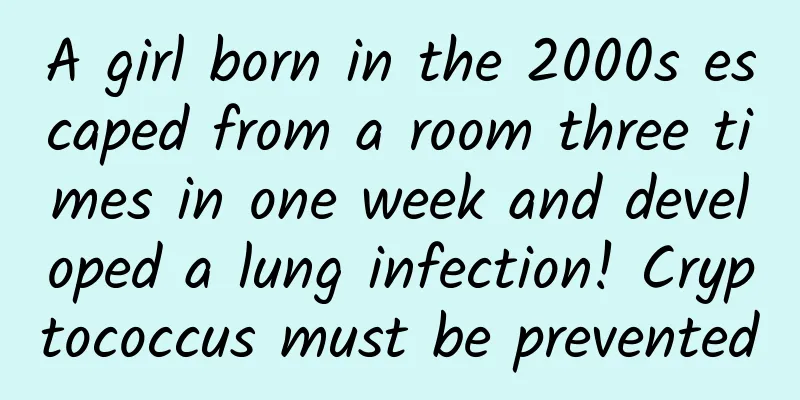A girl born in the 2000s escaped from a room three times in one week and developed a lung infection! Cryptococcus must be prevented

|
recently #A girl born in the 2000s escaped from a room three times in one week and got a lung infection# This topic became the number one hot search Escape room because of the excitement Popular among the new generation of young people But because the environment is closed and the lighting is dim Not only is there a safety hazard Players are prone to being hit or bruised There is also the possibility of contracting some diseases recently Xiaoyou (pseudonym), a 22-year-old girl from Fuzhou After a month of continuous chest pain and dry cough Diagnosed with pulmonary cryptococcosis The source of pathogens It's possible that she frequents here. "Escape Room" Space Played "Escape Room" for 2 consecutive months The girl had chest pain and dry cough for a month Xiaoyou is a "room escape" game enthusiast who has enjoyed playing with classmates since college. A few months ago, Xiaoyou went to a "room escape" game space in Fuzhou to check in two or three times a week. After going there for two consecutive months, Xiaoyou began to experience tightness and pain in the lower left side of the chest. The pain was more severe when taking a deep breath or coughing, and he had symptoms of constant dry coughing. This situation lasted for a month. Seeing that the condition had not improved and not knowing why, the anxious mother took Xiaoyou to the Department of Respiratory and Critical Care Medicine of Fuzhou First Hospital for treatment. "The patient is relatively fat, has bad living habits, and is in poor physical condition." Lin Xinfeng, deputy chief physician of the second department of respiratory and critical care medicine, who received the patient, asked Xiaoyou about her condition in detail and learned that she did not like to eat staple foods, loved to eat snacks and sweets, had an irregular work and rest schedule, habitually stayed up late, and often played escape rooms. Based on Xiaoyou's medical history and the fact that Xiaoyou's symptoms did not improve after taking oral antibacterial drugs, Lin Xinfeng suspected that Xiaoyou might be infected with "pulmonary cryptococcus" based on his previous experience and lung film images taken at other hospitals. Subsequently, Xiaoyou had a blood test and a lung CT scan. The blood test results showed that the qualitative and quantitative indicators of cryptococcus in Xiaoyou's blood were "positive", and the lung CT imaging results also showed that her left lower lung had patchy consolidation shadows with cavities, which are typical signs of pulmonary cryptococcal infection. In order to further clarify the nature of the infection, Deputy Chief Physician Lin Xinfeng performed a CT-guided percutaneous lung puncture biopsy on Xiaoyou. During the operation, it was clearly seen that Xiaoyou's lung lesions had formed a 4cmx2.7cmx4.4cm consolidation shadow. After the cause of the disease was identified, Xiaoyou received standardized anti-cryptococcal treatment during hospitalization and after discharge. A lung CT scan was performed one month later, and the consolidation shadow was reduced to 2.9*1.7*2.6cm in size. Xiaoyou has now returned to work. Cryptococcus is everywhere People with weakened immune systems are more susceptible to infection According to the doctor, Cryptococcus is an opportunistic pathogenic fungus. It can be found in large quantities in soil, bird droppings, fruits, vegetables, especially pigeon droppings, and in human skin, mucous membranes, and feces. Cryptococcus may also be found in large quantities in some closed, dark, damp, and unventilated spaces. This pathogen often sneaks in and easily attacks people with autoimmune diseases, people who use hormones, immune preparations, and other low immunity. Because Xiaoyou is relatively fat, has an irregular work and rest schedule, and has an unbalanced nutrition, his immunity is lower than that of normal people, and he is more susceptible to Cryptococcus infection than normal people. Cryptococcus usually causes respiratory infection after being inhaled from the respiratory tract. The initial infection site is mostly the lungs, but it can spread from the lungs to other parts of the body, including the skin, mucous membranes, lymph nodes, bones, and internal organs. The most vulnerable part is the central nervous system, causing cryptococcal meningitis. Common symptoms of the infected include fever, progressive headache, nausea, vomiting, mental and neurological symptoms (mental confusion, irritability, disorientation, behavioral changes, lethargy, etc.). Patients infected with pulmonary cryptococcus will routinely undergo lumbar puncture to rule out meningitis. Doctors remind: the general public, do not play escape rooms too frequently, and it is best to choose places with good ventilation and sanitary environment. If your body resistance is relatively low, try to avoid going to such places. In addition, it is recommended that everyone should eat healthy, have a proper work and rest schedule, maintain appropriate exercise, and improve immunity. Source: Science Popularization China WeChat Official Account |
<<: Look down at your belly button. If you see these signs, something may be wrong with your body.
Recommend
[Tutorial] How did a 16-year-old hacker install Windows 95 on a smartwatch?
Corbin Davenport, a 16-year-old hacker from Georg...
The principles and methods of swiping the Baidu drop-down box. How to swipe up the Baidu drop-down box on mobile phone?
The feedback keywords in Baidu's drop-down me...
How can I improve video quality? How to make high-quality videos?
Improve video quality in four aspects: picture, t...
Musk: A new generation of flying Roadster sports car will be launched in 2020
Tesla CEO Elon Musk has made many surprising stat...
Simple but not simple DingDong smart speaker review
DingDong smart speaker is the first smart product...
How to effectively use the AARRR model to acquire and convert customers?
Taking two activities as examples, this article s...
Dolphin: It's my friend's urine! Let me taste it carefully丨Tech Weekly
Welcome to watch the science of the week. This we...
Is it reliable to use 8 clams to test the quality of drinking water in the entire city?
Who would have thought that whether people can dr...
The stock market is falling. Are you, a startup, ready for the winter?
[[146861]] As global stock markets tumble, shareh...
How to retain high-value users? Here are some suggestions for you!
The user life cycle of each product is a process ...
I already have lung cancer. Is it meaningless to quit smoking? The truth is...
Recently, the topic #刘谦患pulmonary adenocarcinoma#...
Full process analysis of improving APP push conversion rate
An APP without message push function cannot be ca...
How to deploy huge amounts of Qianchuan?
Bytedance Qianchuan is an e-commerce advertising ...
Unveiling the evolution of “artificial life”: Do genetic coding and electronic engineering both follow Moore’s Law?
Computer programming and gene synthesis may seem ...
As autumn arrives, rhinitis is reported. How to prevent allergic rhinitis?
Review expert: Yuan Xiandao, deputy chief physici...









